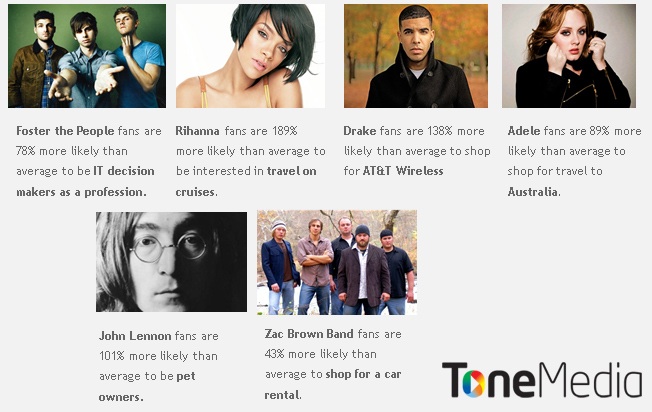Secure your place at the Digiday Media Buying Summit in Nashville, March 2-4

The Feed is Digiday’s Web-culture corner. Check The Feed everyday for Web-culture news roundups, infographics, essays and more. Follow us on Twitter for updates throughout the day @SWeissman.
You are what you listen to, apparently. ToneMedia is using data it has compiled from traffic to its sites, which include music blogs and lyric sites, to deliver targeted ads to consumers based on their musical taste, and it’s uncovered some fairly odd correlations. Here are some examples:
- U2 fans are 116 percent more likely to have a net worth above $100,000 than non-fans.
- Lady Gaga fans are 48 percent more likely to shop for personal technology online than non-fans.
- Katy Perry fans are 115 percent more likely to be interested in purchasing infant care than non-fans (hm, teen moms?).
- Black Eyed Peas fans are 119 percent more likely to be interested in taking out a loan (read into that one what you may).
- This one’s a real curveball: Arcade Fire fans are 131 percent more likely to be NFL fans.
- Fans of Lana Del Rey, the faux-hipster/gangster Nancy Sinatra singer that everyone loves to hate, are 76 percent more likely to be interested in buying a mattress. Go figure.
Check out the infographic below for a few more interesting musical taste and behavior data.
More in Media

In Graphic Detail: Subscriptions are rising at big news publishers – even as traffic shrinks
Publishers are raising prices, pushing bundles and prioritizing retention to make subscriptions a steady business amid volatile traffic.

WTF is Markdown for AI agents?
AI systems prefer structured formats or APIs to ingest and surface content more efficiently. And “markdown” has quickly become the common language used by AI systems and agents.

From feeds to streets: How mega influencer Haley Baylee is diversifying beyond platform algorithms
Kalil is partnering with LinkNYC to take her social media content into the real world and the streets of NYC.






